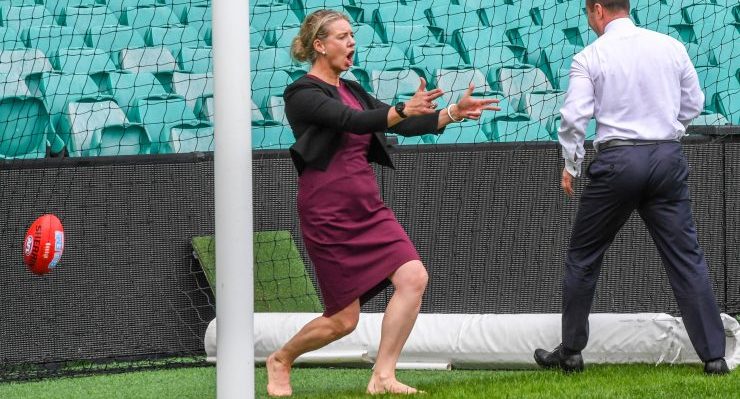
Of the many depressing features of the recent sports rorts scandal, perhaps the worst is its familiarity, given the striking parallels with the Ros Kelly whiteboard affair of the Keating government’s terminal phase in the mid-1990s.
Even allowing for the fact that standards have apparently fallen to the point where Bridget McKenzie looks likely to keep her job, one might have thought the Kelly precedent would have given McKenzie pause for thought as she oversaw the allocation of $100 million in a manner transparently tailored to boost the Coalition’s electoral prospects.
Her failure to do so offers a telling insight into how much political operators imagine they have to gain by enticing voters with expensive baubles.
Given the government’s success in winning a third term when it appeared to have so much going against it, it may be tempting to reach the disheartening conclusion that this outlook has been vindicated.
However, when the election result is analysed in detail, scant evidence emerges that McKenzie’s efforts did the Coalition any good at all.
At issue is the distribution of 684 grants out of the Community Sports Infrastructure fund, around two-thirds of which was allocated to specific clubs and local projects, with most of the rest going to local councils.
The table below accounts for the 20 electorates that did best out of the bargain, and provides as clear an indication as any of the lack of subtlety with which McKenzie went about her work.
Lest anyone think the program was all bad, grants targeting Indigenous communities lifted the Northern Territory seat of Lingiari to the top of the pile, despite it being a long shot proposition for the Coalition at the election.
After that though, the list is a clean sweep of conservative seats, including two the Liberals were hoping to win back from crossbenchers (one being Mayo, where the trouble all began).
Almost all were of the highest strategic importance, being on margins below the Australian Electoral Commission’s 6% threshold for designating a seat as marginal (including Corangamite and Dunkley, which were held by the Liberals but notionally Labor after the Victorian redistribution).
The exceptions at the upper end tended to be held by the Nationals, perhaps for the reasons noted here yesterday by Bernard Keane.
Comparison with the opposite extreme is instructive — the 20 seats that received the least amount of funding consisted of four the Coalition knew they wouldn’t lose, and 16 they knew they couldn’t win.
Did the sports rorts make a difference?

At first glance, it might be thought that the sports grant pork-barrel landed a few successes, with the average Coalition swing of 2.8% out of the top 20 comparing with a national result of 1.2%.
However, this is inflated by a couple of outliers: the north coast New South Wales seat of Page, where Nationals member Kevin Hogan enjoyed the second biggest Coalition swing in the state after Joel Fitzgibbon’s near-death experience in Hunter, and the north Queensland seat of Dawson, where George Christensen defied every political maxim going to pick up the second biggest swing in the country.
In country seats especially, electoral effects of sports club grants should be highly localised — and the deeper one burrows into the data, the harder it gets to discern any such effect.
When polling booth and sport grants data are aggregated into 2288 local regions designated by the Australian Bureau of Statistics, there turns out to be no correlation whatsoever between the amount of funding they received and how much they swung to or against the Coalition.
This should not actually come as a surprise, since the Coalition owed its win not to fortuitous patterns of voting in decisive seats, but to a 51.5% share of the national two-party vote.
In other words, this was an election won at the macro rather than the micro level — in particular, by the force of Scott Morrison’s adroit sloganeering against an unpopular opponent encumbered by an over-ambitious agenda.
As such, the sports grants affair stands testament not just to the deviousness of much of the political class, but also to its egotism in imagining that elections hinge upon ultimately inconsequential tactical manoeuvres cooked up in ministerial offices.








Crikey is committed to hosting lively discussions. Help us keep the conversation useful, interesting and welcoming. We aim to publish comments quickly in the interest of promoting robust conversation, but we’re a small team and we deploy filters to protect against legal risk. Occasionally your comment may be held up while we review, but we’re working as fast as we can to keep the conversation rolling.
The Crikey comment section is members-only content. Please subscribe to leave a comment.
The Crikey comment section is members-only content. Please login to leave a comment.